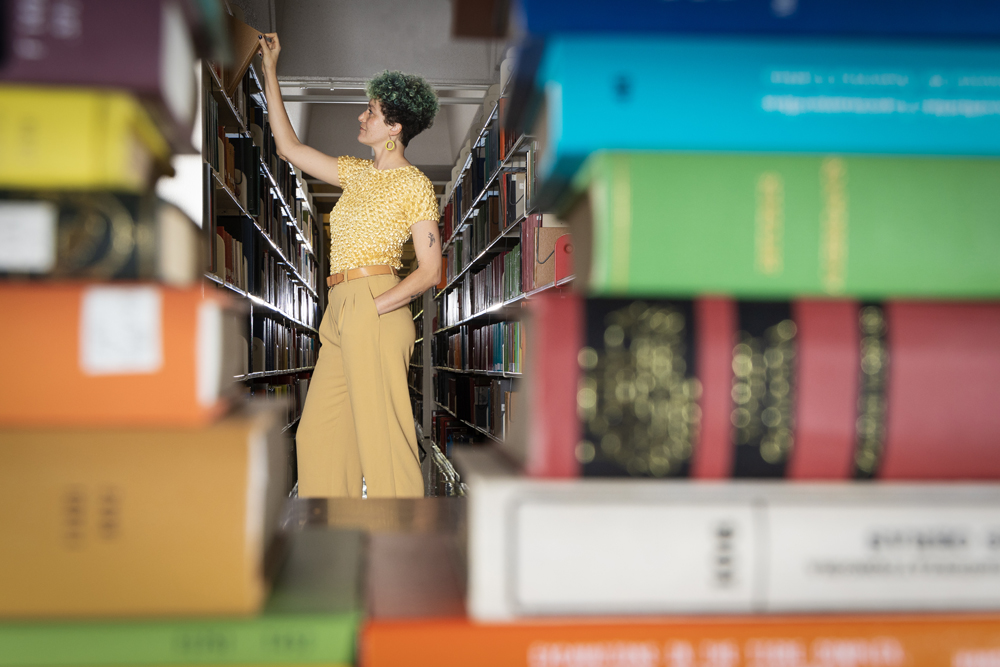Listen to the story:
“I think libraries have been saving me since I was a young kid,” admits Kathryn Desplanque, an art history professor at UNC-Chapel Hill. “It’s amazing to have experienced all the ways they have shepherded me through different times of my life.”
As an art historian, Desplanque’s research has taken place in some of the most famous and beautiful libraries across the world. Like the Bibliothèque nationale de France, home of the iconic Oval Room designed by Jean-Louis Pascal in the late-1800s.
But it is here in Chapel Hill at Davis Library where some of her most exciting projects are happening now. And she gives a lot of credit to the university’s incredible librarians.
“Every researcher and every research question is important — and the people at Carolina’s libraries live that commitment every day,” says María R. Estorino, vice provost for University Libraries and university librarian.
Libraries and librarians are essential to the research lifecycle: a scholar asks a question, pursues research activities to answer it, documents and publishes that work, and then the cycle begins again, building on this new knowledge.
“And we are partners at every stage of this process,” Estorino shares.
In honor of National Library Week, Endeavors connected with six scholars and librarians from across campus to learn how the libraries support their projects.
Digitizing artworks and spaces at Davis Library
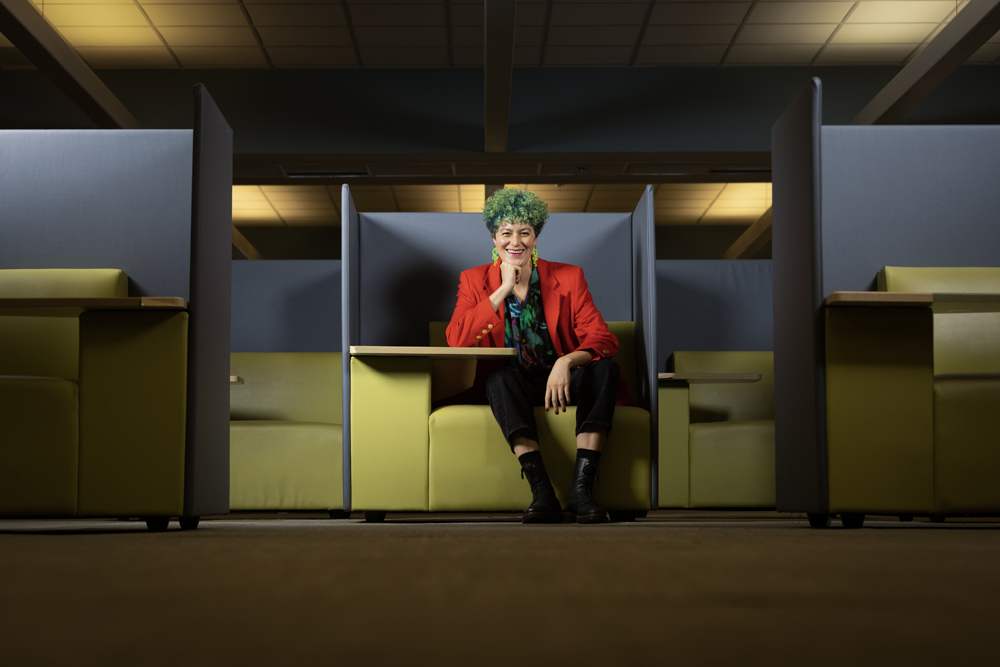
Kathryn Desplanque on the second floor of Davis Library. (photo by Alyssa LaFaro)
From an attic in Carrboro to a nonprofit visual arts center in Raleigh, the “Loving Your Local Art Scene” Maymester course doesn’t disappoint. Taught by Desplanque, the two-week class takes students to over 20 art galleries and exhibit spaces to interview artists and employees about how they make art and connect with communities.
Desplanque worked with GIS Librarian Phil McDaniel to create an interactive map of the galleries her class visited — which just went public so that locals can engage more with the art in their backyard.
The course introduces students to theory and case studies on how DIY art collectives impact the cities they reside in. They look at geography and demographics to explore how these spaces provide safety and a voice to diverse communities.
“I think this is one of the few classes in the humanities where students get to see theories and concepts that they’ve read about in an academic context at play in the real world,” says Desplanque, who is working to create a semester-long version of the course.
Desplanque has also teamed up with Amanda Henley, head of Digital Research Services, to digitize the 18th– and 19th-century French political cartoons from her book “Inglorious Artists.” Desplanque spent nearly a decade collecting over 500 of these from libraries and archives across France. Now, with Henley’s help, the images will live in a free, open-source database so that anyone can access them.
“This will increase the inclusivity of art history, creating pathways to excavate visual cultural objects that have long been neglected,” she says.
“We cannot do research without libraries,” Desplanque stresses. “We need to hire more librarians, give them better budgets and storage, and support any archival process they think they need to invest in. Librarians are the unacknowledged champions of the research process.”
Preserving research materials with the Carolina Digital Repository

Nab Dasgupta in front of the Undergraduate Library. (photo by Alyssa LaFaro)
Posters and presentations. White papers. Data sets. You name it, Nab Dasgupta is uploading it to the Carolina Digital Repository (CDR).
“When I found out about it, I was like, hell yeah. This is exactly the tool we need. It’s awesome,” Dasgupta says, chuckling.
Operated by University Libraries, the CDR supports almost every type of file and gives uploaders the option to make them public.
Dasgupta is a researcher in the UNC Gillings School of Global Public Health focused on addressing the nation’s opioid overdose epidemic. He oversees a variety of epidemiological studies, runs a nonprofit that provides low-cost naloxone to community partners, and manages the UNC Street Drug Analysis Lab, which gives a real-time assessment of the drugs people are using across the U.S.
This work is prolific — and requires a reliable place to store data.
“It’s about the democratization of information,” Dasgupta shares. “A lot of the groups we work with are not academic groups. They are health departments and community health programs, and they don’t have access to journals and publications and paywalls. So having this information available is our responsibility.”
Whenever Dasgupta and his team present at conferences, they upload all their materials to the CDR. Each slide includes a QR code so attendees can find the presentations to reference later if they miss something during the live talks.
Dasgupta also uses the CDR to store white papers, analyses that are too short to become journal articles, and computer code that allows other researchers to reproduce his lab’s work.
“The CDR also helps bring closure,” he says. “So many times we work on open-ended projects, but once we make something public on CDR, it helps draw that chapter of work to a close.”
Pairing words and images at Wilson Library’s Special Collections
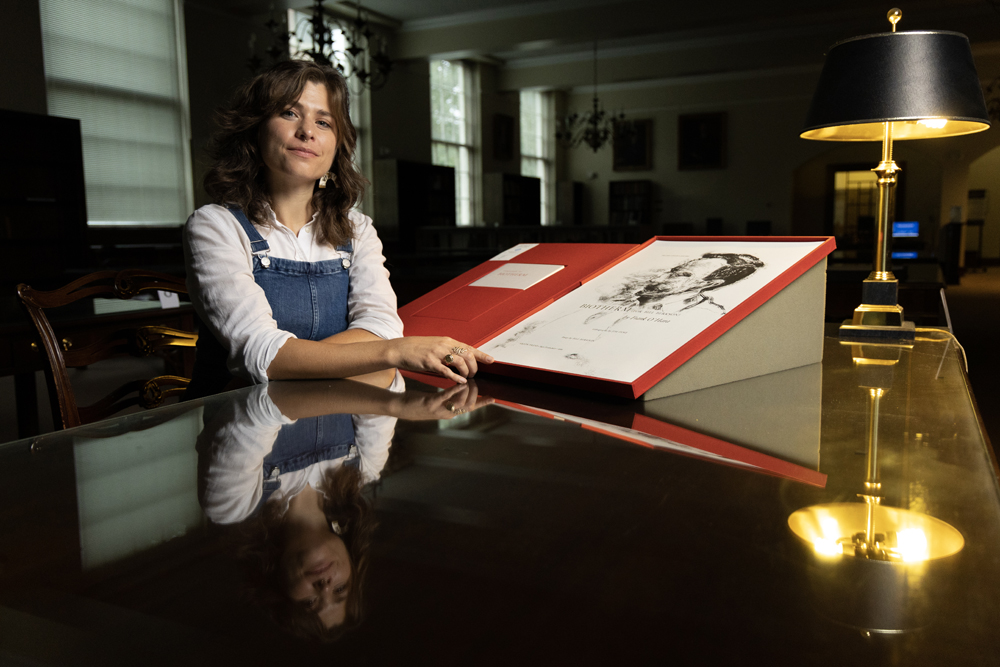
Jo Klevdal in the Special Collections Reading Room at Wilson Library. (photo by Alyssa LaFaro)
A picture’s worth 1,000 words — and Jordan Klevdal agrees. So much that the English and comparative literature PhD student is studying the history of using images alongside printed words.
“I’m thinking about how readers from the 20th century got used to seeing images in the context of what they’re reading,” she says. “Are they learning to read images? What is the actual interaction between the text and the image?”
While some of Klevdal’s work on this topic looks at simpler word-image pairings like captions with photographs, she’s especially fascinated by illustrated poems, where it’s unclear whether the words explain the drawings or the drawings represent the text.
More specifically, she’s studying the poetry of Frank O’Hara, a mid-20th-century writer, critic, and curator at the Museum of Modern Art who often collaborated with artists for his own work. Wilson Library houses a wealth of his rare edition books. One of them, called “Biotherm,” combines Ohara’s poetry with obscure drawings from American artist Jim Dine.
At Wilson, Klevdal worked with librarian Jason Tomberlin to narrow her scope and determine which works of O’Hara’s she was most interested in. This was key to the research process for Klevdal and what helped her discover materials she didn’t even know existed.
“Librarians have a wealth of knowledge and bring up things totally not on your radar,” she shares. “When you use search engines or finding aids, you find an answer and you’re done. Librarians not only help you find what you’re looking for, but materials associated with that topic.”
Boosting research equity at Health Sciences Library
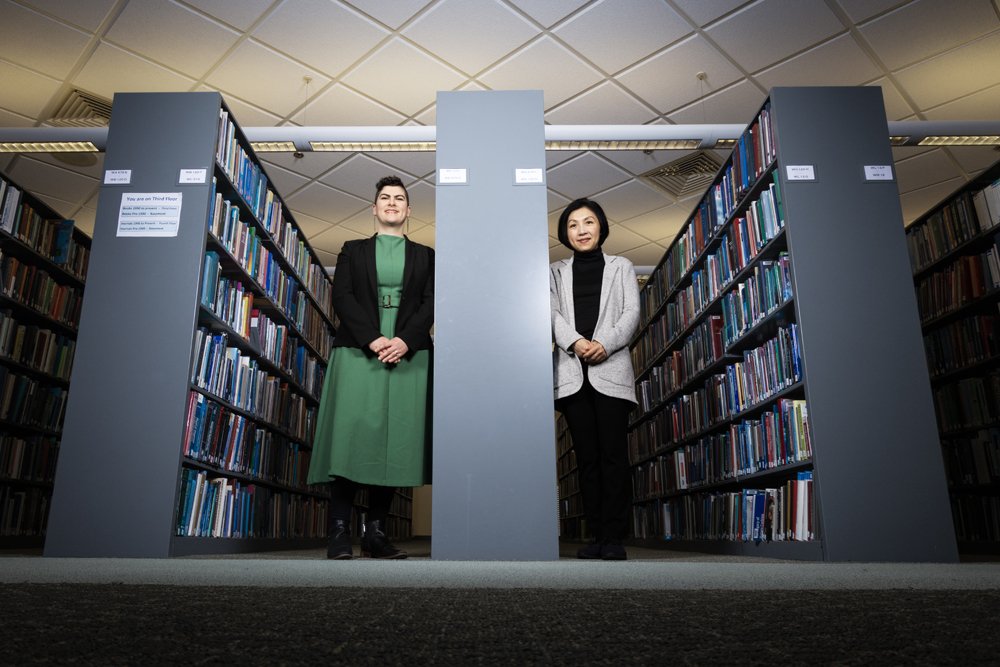
Carrie Baldwin-SoRelle and Fei Yu in the Health Sciences Library. (photo by Alyssa LaFaro)
Health science librarians Carrie Baldwin-SoRelle and Fei Yu are collaborating with researchers at the UNC Gillings School of Global Public Health for a project with The Lancet. In 2023, the medical journal announced a new commission focused on improving how life-saving and -enhancing research is deployed globally, especially in low- and middle-income countries.
“This project makes sure that changes in health, medicine, and policy are effectively serving populations in a fair and equitable way, based on the best possible information we have,” Baldwin-SoRelle says.
“This is really about improving health equity across the world,” Yu adds.
Herbert Peterson, a maternal and child health professor in Gillings, is chairing the commission, and Yu and Baldwin-SoRelle are providing research support for the project. After meeting with commission administrators to uncover their needs, the librarians develop strategies to find journal articles and other research materials that best answer their questions.
For example, if a commission member requests all papers produced in the field of implementation science in the last 10 years, Baldwin-SoRelle would create a detailed search within a database like PubMed to find them. She’s often thinking about audience and accessibility as many of the countries this project serves lack resources.
“We ask a lot of questions,” Baldwin-SoRelle stresses. “Will this research be publicly accessible to anyone anywhere in the world with an internet connection and not locked behind paywalls? Are we searching appropriate databases to find representative literature from across the world? PubMed is a useful tool for a lot of U.S.-based researchers, but how well does that capture literature published by researchers in Nigeria, Indonesia, and Peru?”
Yu focuses more on bibliometrics, a statistical analysis of the publications themselves, to uncover information like where the studies they’re collecting took place and who funded them.
“The commission is grappling with an insurmountable quantity of information — and we want to contextualize it to help them make decisions,” Baldwin-SoRelle says.
“We are indispensable partners,” Yu adds. “Librarians are researchers’ best friends.”
Creating courses at Knapp Library
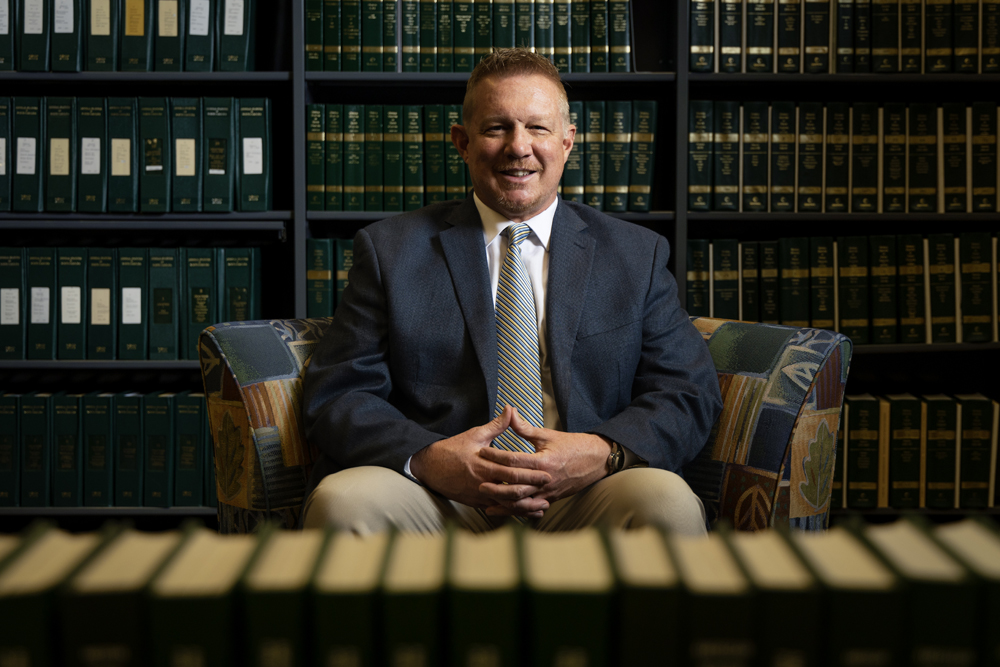
Kirk Boone on the second floor of the School of Government’s Knapp Library. (photo by Alyssa LaFaro)
North Carolina law requires county assessors to reappraise property at least once every eight years — even though it’s considered best practice to do it more frequently, according to UNC School of Government (SOG) researcher Kirk Boone, who says failing to reappraise regularly can create a lot of inequities for property owners.
Imagine someone in rural Orange County owns a house appraised by the assessor at $200,000 in 2017, but today it’s worth $250,000. Without a reappraisal, the homeowner would pay property taxes on 80% of today’s value. That doesn’t sound too bad — until we look at a different example.
Another house in the county also received a $200,000 appraisal in 2017, but it’s located in downtown Chapel Hill, where home values may increase at a different rate. Now, it’s worth $350,000. This homeowner is paying taxes on 57% of their home’s value, which is significantly lower than the person above. That is not equitable.
“This is a big deal for assessors,” Boone says. “Going eight years without a property reappraisal is not good for anybody. It might initially save local governments a little money to delay reappraisal, but it’s not fair and equitable for citizens. And all the experts agree on that. So why are we allowing it?”
To tackle this problem, Boone collected resources from the SOG’s Knapp Library to build a two-day workshop for county assessors called “Reappraisal in North Carolina.” Held for the first time in 2023, the course enrolled nearly 100 county employees to help fulfill their continuing education credits required by the N.C. Department of Revenue.
Boone worked with the library’s Frank Alford and Alex Phipps to gather information on the history of assessing legislation in North Carolina, which dates back to 1883, and how the SOG was part of the discussion with legislators. This built the foundation for the workshop.
“This helped build a story around what I’m teaching, otherwise property tax can be very boring,” Boone says with a laugh. “But if we go back in time to talk about why our policymakers and counties and senators made these decisions, it makes that story more exciting.”
Making archives accessible at the Southern Historical Collection
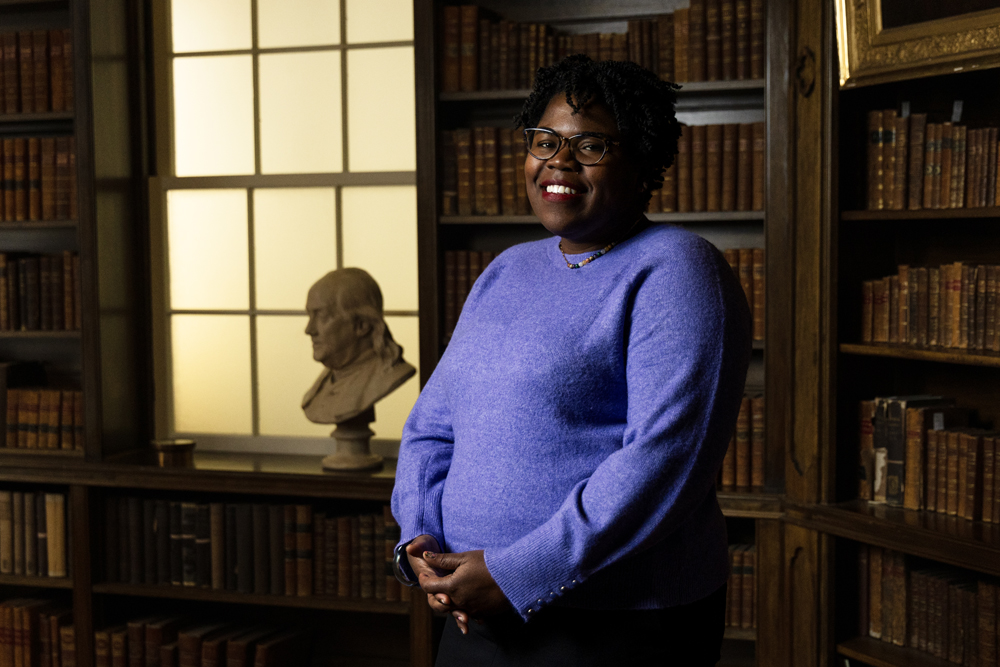
Chaitra Powell in the Hayes Library at the North Carolina Collection Gallery within Wilson Library. (photo by Alyssa LaFaro)
“I like to think about primary source materials as the key to the universe and what can be known,” Chaitra Powell says. “Like if we don’t collect them, then scholars can’t do research, and books and movies can’t be made.”
Powell leads the Southern Historical Collection (SHC), which houses thousands of first-person sources on the South, from handwritten papers, letters, and diaries to photographs and oral histories. Her team manages the collection, helps incorporate it into classes across campus, oversees community outreach efforts, and conducts their own research.
Meaghan Alston, assistant curator for the African American collections, is leading one of their most recent projects: “On These Grounds.” This is a national, collaborative effort to collect pre-Civil War slavery records and upload them into a digital database that can be accessed by the public.
These records include birth and death dates, events like baptisms and marriages, medical and geographic information, and work history. After three rigorous years of uploading materials, Powell hopes the database will go public in Fall 2024.
“This will be an incredible resource,” Powell says. “To have a centralized database where you can search someone by name, location, or event — and in writing that you can read — is huge.”
Engaging communities in archives is central to Powell’s work. In 2017, the SHC began its “Archivist in a Backpack” program to provide community members with tools like Zoom recorders and scanning equipment to collect their own histories.
Most recently, they’ve received funds to build more backpacks and now offer project-specific kits for recording oral histories, documenting physical spaces, and preserving artifacts.
“I think being involved in all these projects lets people know we’re interested in a broader view of history and puts our collection in conversation with other things,” Powell says. “We need a variety of methods to tell a variety of stories.”


